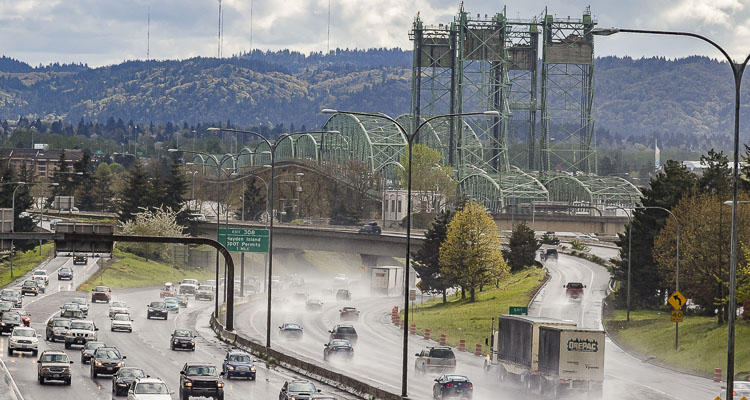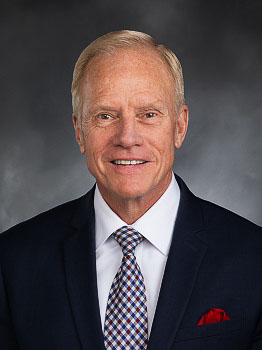
C-TRAN Chief Executive Officer Shawn Donaghy responds to Clark County Today’s inquiry
If light rail is going to be a component of an Interstate Bridge replacement project, C-TRAN Chief Executive Officer Shawn Donaghy is clear that the agency he leads is not going to be responsible to operate it or be financially responsible for it.

On April 21, the Interstate Bridge Replacement Program (IBR) team announced that light rail would be the locally preferred alternative as a transit option for the new bridge. The IBR team is proposing a light rail extension along I-5 to Evergreen Blvd. The belief is a light rail stop at Evergreen Blvd. near the Vancouver library is the best location to connect C-TRAN with TriMet.
Donaghy said at the time this project presents the best opportunity to connect C-TRAN with TriMet. He believes the “running I-5” scenario is best, rather than going on downtown Vancouver streets. However, what C-TRAN’s CEO didn’t say at that time was that the light rail element of the project needs to be managed and operated by TriMet, not C-TRAN, or even a combination of the two agencies.
“C-TRAN through our work on the IBR’s ESG (Executive Steering Group), some of the Bi-State Legislative meetings, and our Board meetings have noted that the agency does not believe it should cover the operating expenses for services that we do not operate,’’ Donaghy told Clark County Today in an email exchange. “C-TRAN’s current service modes include Fixed Route, Demand Response, Bus-Rapid-Transit, and Express Bus Service (with Bus-on-Shoulder). C-TRAN has stated that any new transportation mode that may be introduced into the bridge influence area as a function of the IBR project, would need to be covered by the agency who operates that mode, or by an agency other than C-TRAN.
“C-TRAN’s public funding should remain in Southwest Washington to help expand and support service for the citizens of Clark County,’’ he wrote in the email. “The Oregon Transportation Commission has advised us that they cannot share revenues with C-TRAN because we are an out-of-state agency – despite the fact that we transport many workers to the Portland Area who contribute significant local taxes there.’’
The question to Donaghy was prompted by comments Rep. Paul Harris made in an interview with Clark County Today after the IBR team’s April 21 announcement.
“I’m a ‘no’ on light rail,’’ said Harris, referring in general terms. However, he clarified that statement by saying “it’s a different realm than if we as Clark County, or C-TRAN, is responsible for that huge loss, whatever it is. We will see if they (TriMet) actually sign that document, but that is huge.’’
Donaghy indicated that there is no current contract, unsigned or otherwise, that stipulates TriMet will be responsible for the operation and finances of the light rail extension into Vancouver. But, he was very clear in his stance that C-TRAN will not be responsible for the light rail element of the project.
“As such, and to Representative Harris’ point, C-TRAN’s intention is that the agency would not pay for the capital, operational, or on-going expenses associated with LRT within the bridge influence area,’’ Donaghy said. “While C-TRAN does not have a contract in place waiting to be signed, we have had these very direct conversations with the IBR program – who we feel is responsible for managing the outcome of this request. This would also need to be approved by our Board of Directors which could occur as part of the agency’s adoption of the Locally Preferred Alternative later this spring or early summer.’’

IBR Program Administrator Greg Johnson told Clark County Today the details were still being finalized. However, his version of the discussions seemed surprisingly different compared to the statement by Donaghy.
“The Interstate Bridge Replacement (IBR) program is working to update the conceptual finance plan for capital construction costs, with the goal to have it updated this fall,’’ Johnson stated in an email exchange. “Given the size of this project, we know that multiple sources of funding are needed including state, federal, and tolling sources.
“The IBR program is currently developing a Transit Operations and Maintenance Finance Plan in close coordination with our transit partners that will help fund the transit investments,’’ said Donaghy, who was referring to C-TRAN and TriMet as the project’s transit partners. “We are collaborating with both of our transit partners related to operations and maintenance and are confident we will arrive at an outcome that works for all agencies. Once a decision is reached between the agencies, it will be documented in an agreement between ODOT, WSDOT, and the transit agencies.’’
Is light rail financially feasible?

As he stated earlier, Harris scoffs at the notion that a light rail extension can pay for itself.
“I don’t believe light rail will ever pay for itself,’’ said Harris, who believes that it is very revealing that TriMet officials, apparently, think it can be.
Harris illustrated his point with a hypothetical story about what TriMet officials are planning.
“I’m not stupid, but I am a business man,’’ he said. “I have a business guy come in and say ‘I’m going to put up a shop. I’ve set up 30 of them and all of them have lost money, but I think I’m going to break even on this one.’ That’s the dialogue I’ve heard. I believe that’s what they’re saying.’’
So, how do TriMet officials believe they will be able to keep from losing money on a light rail extension into Vancouver?
“They are going to charge me a toll on that I-5 area, no matter what, no matter if we do nothing at all. I’m going to have a toll when I enter Oregon before milepost 1 because they have no money,’’ said Harris, referring to the state of Oregon’s tolling plan.
The amount of those tolls has not been revealed. However, Harris feels TriMet officials must believe the tolls will be high enough that the financial burden will force Southwest Washington commuters out of their cars and onto light rail.
“I do believe the vast majority of people still want to get in their car and go to work,’’ Harris said. “Do they (TriMet officials) want us in our cars? Absolutely not. It’s that simple … To me, that tells me there is going to be a high enough cost for driving on I-5 that it’s going to displace some people from their cars. I don’t believe that, but I think that’s what they believe. They think they’re going to divert enough people to make it at least a wash. This could become a very expensive trip.’’
Vancouver City Council Member Bart Hansen has repeatedly expressed concern regarding the tolling aspects of the IBR. He’s okay with tolls to pay for the bridge. Hansen worries the ODOT “congestion pricing” on top of bridge tolls will serve to create “roads for the rich.”
Agreement between agencies is ‘non-enforceable and void’
In the fall of 2013, during the failed Columbia River Cross (CRC) project, C-TRAN officials entered into an interlocal agreement with TriMet. That contract, heavily criticized by area citizens and elected officials, ceded eminent domain authority to TriMet.
The contract included a $5 million penalty clause, which meant that if C-TRAN failed to live up to the terms of the deal, Southwest Washington taxpayers would be on the hook for the $5 million. The contract included language that said the contract was “absolute and irrevocable.”
That contract was entered into prior to Donaghy’s arrival at C-TRAN.
“In a Board Meeting shortly after my arrival, I was asked about the agreement between TriMet and C-TRAN during the original CRC project,’’ Donaghy told Clark County Today. “I have been clear that conditions of the project, and the intended outcomes have changed significantly since the first iteration of this project – and C-TRAN considers this agreement non-enforceable and void.
“It is important to note that C-TRAN has been adamant that the program be very aware of potential displacement and footprint on any piece of the project, but especially with transit,’’ Donaghy said. “One of the reasons that we advocated for Evergreen (Blvd.) was to create a situation that connects the transit agencies together with a smaller footprint, and mitigating displacement to neighborhoods.’’




